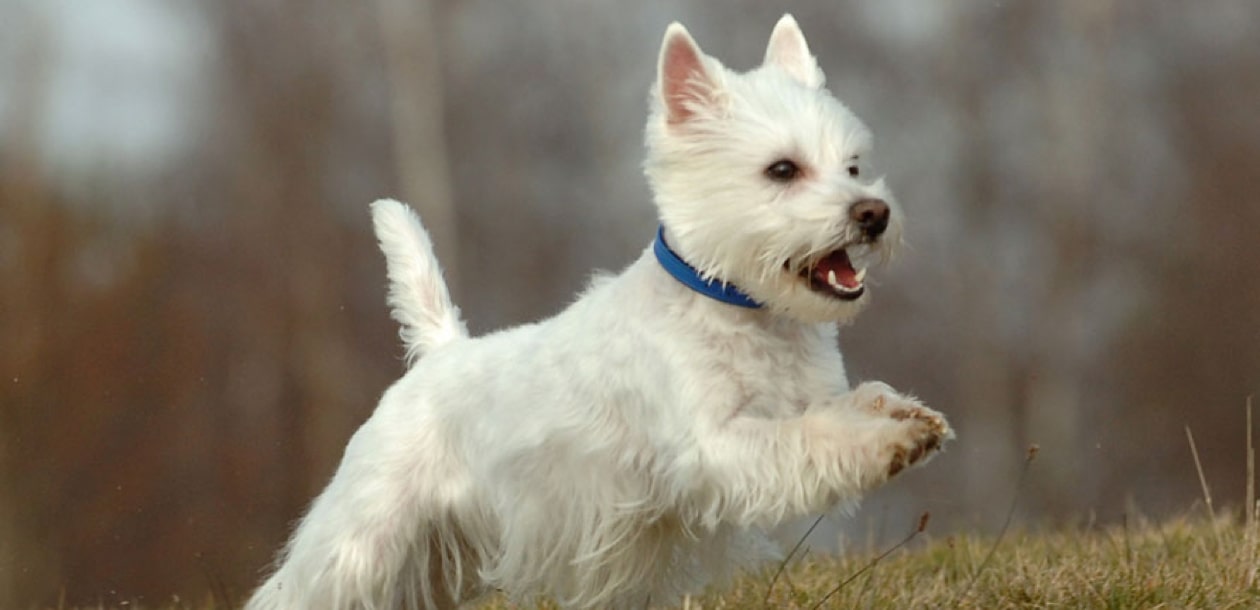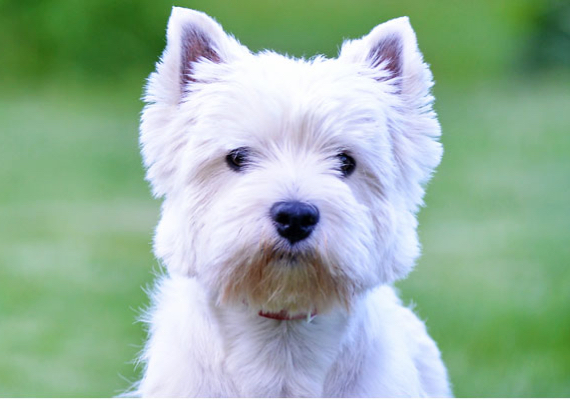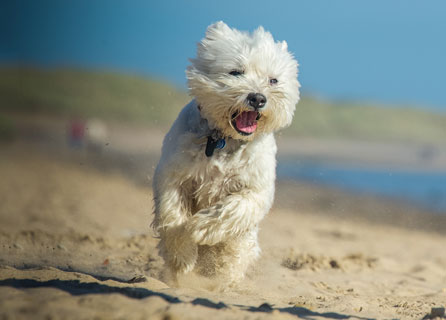
West Highland White Terrier breed guide
Happy and endearing, with a confidence you can’t help but warm to. West Highland White Terriers are small, stocky and energetic, with big personalities and highly inquisitive natures. Find out more about this lively, robust and fun dog, from their temperament and how they should be groomed, to their health and exercise needs.
Breed information and advice
West Highland White Terriers are brave and tough, as they belong to the terrier breed group that was developed to hunt vermin such as rats and badgers. They’re also affectionate dogs and get along with everyone, including strangers and other pets, so make a great addition to the family. Here’s more you should know:
- This breed needs plenty of training, as they are naturally headstrong.This breed needs plenty of training, as they are naturally headstrong.
- An adult Westie will need daily brushing to rid them of excess hair.An adult Westie will need daily brushing to rid them of excess hair.
- They’ll typically weigh between 6kg and 10kg, when fully grown.They’ll typically weigh between 6kg and 10kg, when fully grown.
- A healthy West Highland White Terrier can live for 12 to 16 years.A healthy West Highland White Terrier can live for 12 to 16 years.
Typical size of a West Highland White Terrier: Small: 25cm-28cm

Recommended exercise and nutrition
West Highland White Terriers are energetic and will need two half hour walks a day and you should also make time to play with your dog inside or outside of the house. If you’ve got enough room in the hallway, a few games of fetch will get them eager to please.
Your dog will need a structured mealtime, with food split across two meals. The exact amount they will need will depend on their age, weight and how physically active they are. Be careful not to overfeed them, as they will keep eating.
Up to one hour of exercise per day
Make sure this breed gets daily walks and plenty of playtime, both inside and outside of the house.

Common health problems and illnesses
West Highland White Terriers are generally healthy dogs but they’ll need regular check-ups and vaccinations to stay in good shape. There are some conditions that this breed may be more prone to, and it’s worth being aware of the main symptoms, so you know what to watch out for.
Atopy, or atopic dermatitis, is itchy skin that is caused by an allergic response to environmental allergens. Symptoms of Atopy include itching on affected skin areas, frequently face, feet, armpits, front legs, and abdomen. Your dog may also experience Otitis Externa - a type of inflammation of the external ear canal. You can reduce the risk of this flaring up by gently cleaning your dog's ears once a week using a mild ear cleaner. This is also recommended after swimming. Anal gland problems are also linked to Atopy. You may be aware of a strong, fishy odour and notice your dog scooting along the ground or licking their bottom often. Take them to the vet if you suspect this issue. The glands will be emptied and checked for signs of infection.
Idiopathic Pulmonary Fibrosis may also be referred to as ‘Westie Lung’. This is a progressive condition that takes 1-2 years to develop; it is commonly seen in elderly West Highland White Terriers. This disease causes the lungs to become inflamed, thickened and scarred. It tends to result in:
- Loss of exercise tolerance
- Excessive panting
- Difficulty breathing
- Coughing
There is no cure for this condition so the aim is to slow down the rate of progression of the disease as much as possible. If diagnosed in the early stages, it can often be managed more successfully. Please speak to your vet if you have any questions or concerns.
This condition that develops when there’s a severe lack of tear production. It can be very painful and if left untreated, can lead to conjunctivitis, eye ulcers, and in severe cases, permanent scarring, or even loss of an eye. It usually affects both eyes and causes symptoms such as:
- Red, inflamed, irritated, and painful eyes
- Frequent squinting and blinking
- A thick, sticky discharge
- Cloudy/dull eyes with a lack of shine
- Frequent eye infections
- Frequent eye ulcers
Speak to your vet if you think your dog might have dry eye, or if you notice any of the symptoms listed above.
Craniomandibular Osteopathy, also known as 'westie jaw', is often seen in West Highland Terriers. There’s excessive growth of the bones of the skull, particularly of the lower jaw causing swelling, reduced appetite, drooling, pain on opening the mouth and, in some cases, a fever. Your vet will diagnose this disease on physical examination an X-ray of the jaw area.
Find out about insurance for your West Highland White Terrier
Learn how pet insurance works and what kind of cover you might need for your dog.
Grooming advice
The long haired, fluffy appearance of your terrier is their trademark - and while they won’t shed much, you may find their coat needs trimming as it can quite quickly grow out of control. Daily brushing will keep their coarse fur tidy and presentable. Get them into this habit when they're a puppy and the experience will become part of their routine.
Bathe as required to keep them clean, and wipe their white coat down with a damp cloth every week or two to keep them sparkling. Your dog’s nails can grow quite fast and will need clipping, but only when you can hear them before you see them has this become a problem.
Daily tooth brushing is recommended, as smaller breeds tend to have more dental issues such as bacteria and tartar build-up.
Fun and interesting facts
- Your dog goes by many names, including Poltalloch Terrier, Roseneath Terrier, White Roseneath Terrier and Westie (or Westy).
- As the face of a well-known brand of dog food, this breed is one of the most widely-recognised in the world.
- Your dog will love digging, which will either make them a great or terrible help in the garden.
- Famous owners of the West Highland White Terrier have included British actor Robert Pattinson, and the late director Alfred Hitchcock.
- King James I would give his visitors a Westie as a token of his appreciation.
Important information
The content on this page aims to offer an informative introduction to pet breeds, but does not constitute expert veterinary advice. If your dog or cat falls ill or has an injury, contact your vet immediately.
All facts and figures were correct at date of publication and were compiled using a range of sources.
Discover more breeds
Browse our other cat and dog guides to learn about some of the UK’s most popular breeds.